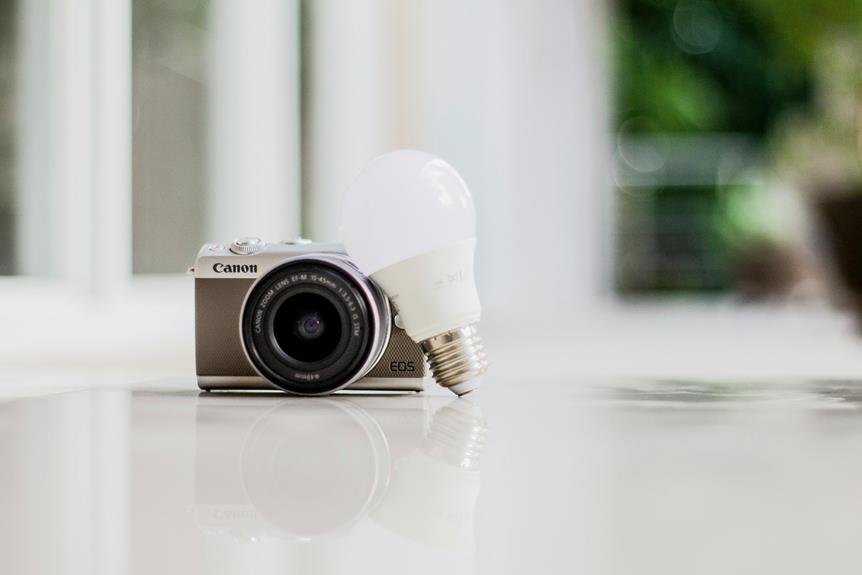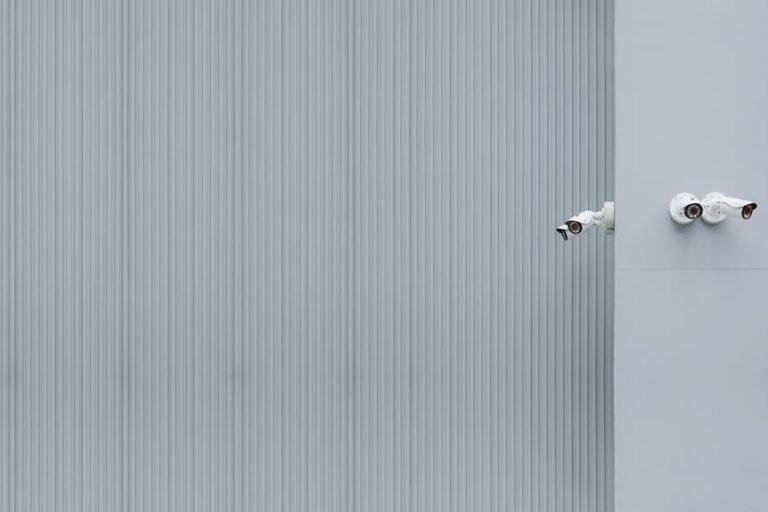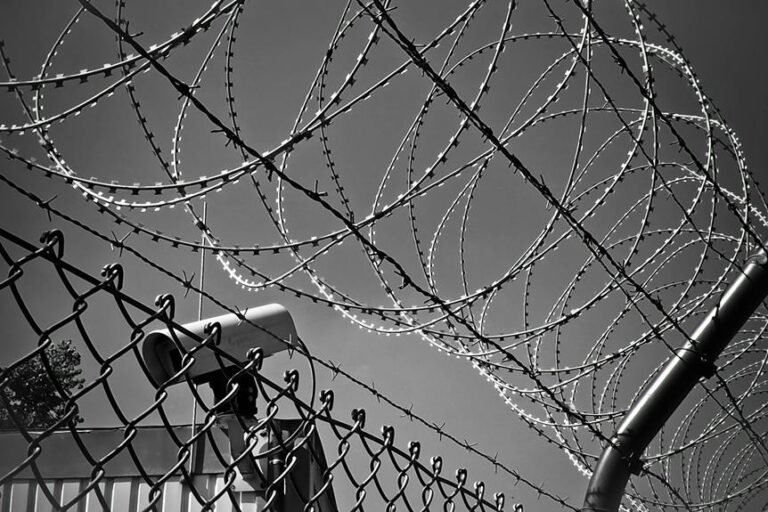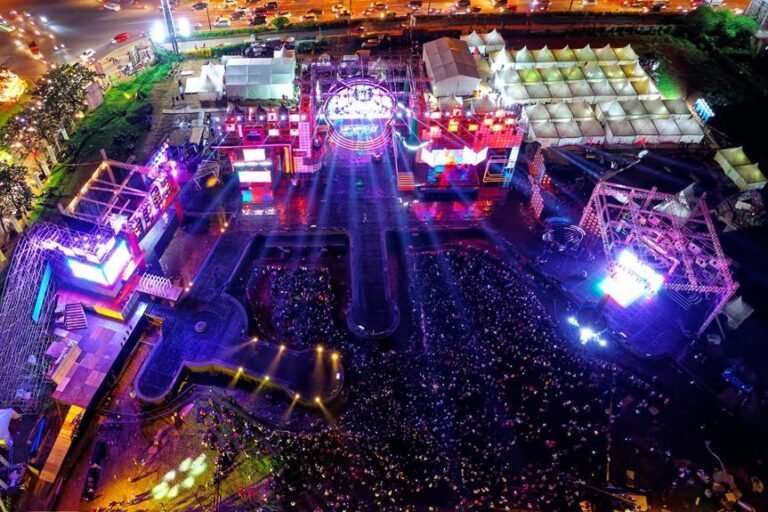Illuminate Your Security: Light Bulb Security Camera Reviews Unveiled
Enhance your security game with light bulb security cameras! These nifty devices offer easy installation, remote monitoring, and seamlessly blend into your home. Opt for high-definition cameras for clear footage, and check for good night vision capabilities up to 30 feet. Guarantee a stable Wi-Fi network for uninterrupted connectivity. Adjust settings for top-notch performance and explore user reviews to gauge satisfaction levels. Remember, finding the right security camera is essential for your safety. So, delve into the world of light bulb security to discover the perfect fit for your needs!
A Quick Overview
- Enhanced security through seamless integration of lighting and surveillance features.
- Cost savings potential by combining functionalities in a single device.
- Easy installation process with reliable performance.
- Privacy considerations for constant monitoring in home settings.
- Evaluate security needs, convenience, and drawbacks before purchase.
Introduction to Light Bulb Cameras
Light bulb cameras offer a convenient installation process, making it simple to boost your home security. With remote monitoring capabilities, you can easily keep tabs on your property from anywhere. These cameras provide a subtle way to enhance your security without sacrificing style.
However, while they offer innovative features, some users may find them to be more expensive than traditional security cameras. Additionally, the reliance on Wi-Fi connectivity may pose a risk if the network experiences outages or interruptions.
It's important to weigh both the benefits and potential drawbacks before investing in light bulb cameras for your home security needs.
Camera Quality Comparison
When assessing light bulb security cameras, it's essential to compare the camera quality to ensure optimal performance and clear surveillance footage. Here are key aspects to consider:
- Resolution Comparison:
- Positive: Opt for cameras with high-definition resolution to capture detailed and sharp images for better identification.
- Negative: Lower resolution cameras may result in pixelated or blurry footage, hindering effective surveillance.
- Light Source Interference:
- Positive: Choose cameras that handle light sources effectively to prevent issues like glare or overexposure, ensuring well-balanced footage.
- Negative: Poorly managed light sources can lead to washed-out or distorted images, impacting the overall quality of surveillance.
- Color Accuracy:
- Positive: Select cameras known for accurate color reproduction, enhancing image quality with realistic and vibrant color representation.
- Negative: Cameras with color inaccuracies may produce dull or distorted images, compromising the visual clarity of surveillance footage.
Camera's Night Vision Capabilities
Assessing the night vision capabilities of a light bulb security camera is essential to ensure effective surveillance in low-light environments.
Positive Points:
- Night vision range: The camera's ability to see in the dark is impressive, with a range of up to 30 feet providing full coverage of the area.
- Low light performance: The camera excels in capturing details in dim lighting, producing clear and sharp images even in challenging conditions.
- Clarity in darkness: The footage remains clear and usable during the darkest hours, allowing for reliable monitoring throughout the night.
Negative Points:
- Night vision range: The camera's range may be limited to only 15 feet in some models, reducing the area that can be monitored in complete darkness.
- Low light performance: In extremely low-light conditions, the camera may struggle to capture fine details, resulting in slightly grainy footage.
- Clarity in darkness: While the camera maintains decent clarity in darkness, there may be instances where the footage appears slightly pixelated or blurry, affecting the overall quality of surveillance.
Potential Connectivity Issues
To ensure uninterrupted operation, addressing potential connectivity issues is crucial for maintaining the optimal performance of the light bulb security camera. When setting up your camera, it's important to be aware of the following factors:
- Network Reliability:
- Positive: A stable Wi-Fi network ensures continuous monitoring without disruptions.
- Negative: Inconsistent network connectivity can lead to gaps in surveillance and missed alerts.
- Signal Strength:
- Positive: Strong signal strength is essential for seamless video streaming and high-quality footage.
- Negative: Weak signal strength may result in video buffering, pixelated images, or even loss of connection.
- Interference:
- Positive: Identifying and eliminating sources of signal interference, such as other electronic devices or walls obstructing the signal, ensures a smooth and reliable connection.
- Negative: Signal interference can cause disruptions in video transmission, impacting the overall effectiveness of the security camera system.
Performance Analysis: Night Vision
When evaluating light bulb security cameras, one key aspect to keep in mind is the performance of their night vision capabilities.
You'll want to pay attention to the clarity of the night vision, how far it can see in the dark, and how sensitive the infrared sensors are.
These factors can make a big difference in how well your security camera performs when the lights go out.
Night Vision Clarity
To achieve optimal night vision clarity, it's crucial to adjust the camera's settings to improve visibility in low light conditions. This is vital for ensuring the camera operates at its best in surveillance scenarios. By tweaking the settings appropriately, you can ensure the camera captures sharp images even in poorly lit areas. Mastering the art of optimizing low light performance can significantly enhance the efficiency of your security system.
Positive Points:
- Adjusting the camera settings can enhance visibility in low light conditions.
- Optimal settings can improve night vision clarity for better surveillance outcomes.
- Clear images can be captured even in dimly lit areas by fine-tuning the settings.
- Optimizing low light performance can boost the effectiveness of your security system.
Negative Points:
- Incorrect settings adjustment may result in poor image quality in low light.
- Failure to optimize low light performance can lead to less effective surveillance.
- Inadequate adjustments may compromise the camera's ability to capture clear images at night.
- Neglecting to fine-tune settings for low light conditions may hinder the overall performance of the security system.
Range in Darkness
Fine-tuning the night vision settings on your light bulb security camera can significantly enhance its performance in low light conditions. Optimizing these settings allows for an extended surveillance range, enabling the camera to capture clear footage even in challenging lighting environments. This enhanced visibility can help you monitor your surroundings more effectively, providing an added layer of security to your space.
However, it's important to note that adjusting night vision settings may also have some drawbacks. For instance, increasing the sensitivity too much can result in a grainy or distorted image, reducing the overall clarity of the footage. Additionally, overly bright infrared lights can sometimes attract insects or other pests, potentially obstructing the camera's view and affecting its performance.
Infrared Sensor Sensitivity
Adjusting the infrared sensor sensitivity of your light bulb security camera can significantly boost its night vision capabilities. This enhancement enables better detection of motion in low-light conditions, increasing the chances of capturing any potential security threats during nighttime.
However, be aware that higher sensitivity levels may lead to false alarms triggered by movement such as animals or tree branches swaying in the wind. Striking the right balance is essential to ensure effective security monitoring without compromising on unnecessary alerts.
Customer Satisfaction Levels
When evaluating light bulb security cameras, customer satisfaction levels play a crucial role in determining their effectiveness. Customer feedback analysis and user experience evaluations reveal a mix of positive and negative reviews for these devices.
On the positive side, users praise the easy installation process, remote monitoring features, and the sense of security they provide. However, some users have expressed concerns about connectivity issues, limited field of view, and occasional technical glitches.
While many homeowners find light bulb security cameras to be a valuable addition to their home security setup, it's important to consider both the strengths and weaknesses of these devices before making a decision.
Is It Worth Trying?
When considering the option of installing light bulb security cameras, it's crucial to evaluate the advantages and disadvantages in relation to your unique security requirements and preferences.
One of the key benefits is the cost-effectiveness, as these cameras integrate both lighting and surveillance capabilities. This can potentially save you money compared to purchasing separate devices.
On the other hand, a major drawback is the potential invasion of privacy that comes with constant monitoring.
It's important to carefully weigh these factors against your priorities before deciding whether light bulb security cameras are the right choice for you.
User Ratings Summary
When exploring user ratings for light bulb security cameras, it's important to consider both positive and negative feedback. Positive reviews often emphasize the ease of installation and setup process, as well as the reliable performance of the camera. Users may highlight how seamlessly the camera integrates into their home environment and how it provides peace of mind through effective surveillance.
On the flip side, negative reviews may point out challenges in setting up the camera, such as connectivity issues or complex installation instructions. Users might also express frustration if the camera malfunctions or stops working after a short period of use, raising concerns about its long-term reliability.
Frequently Asked Questions
Are Light Bulb Cameras Compatible With Smart Home Devices?
Yes, light bulb cameras easily integrate with smart home devices, offering seamless connectivity. The installation process is quick and straightforward. You'll love the convenience and peace of mind these cameras bring to your home security setup.
How Long Is the Warranty for Light Bulb Security Cameras?
Warranty lengths for light bulb security cameras vary, typically ranging from 1 to 2 years. To guarantee peace of mind, prioritize companies with excellent customer service responsiveness for timely assistance and support throughout the warranty period.
Can the Camera Be Controlled Remotely While Away From Home?
Yes, you can control the camera remotely while away from home, offering convenient remote monitoring capabilities. However, make sure to address any privacy concerns that may arise from accessing the camera feed outside your home network.
Do Light Bulb Cameras Have Motion Detection Alerts?
Yes, light bulb cameras have motion detection alerts for added security. They can alert you via the app if there's any movement, giving you peace of mind. Plus, they offer privacy controls and seamless app integration.
What Is the Average Lifespan of a Light Bulb Security Camera?
Light bulb security cameras typically last two to five years. To extend their lifespan, clean them regularly and avoid harsh weather exposure. Consider energy-efficient models to reduce costs and environmental impact. Stay secure without breaking the bank.







